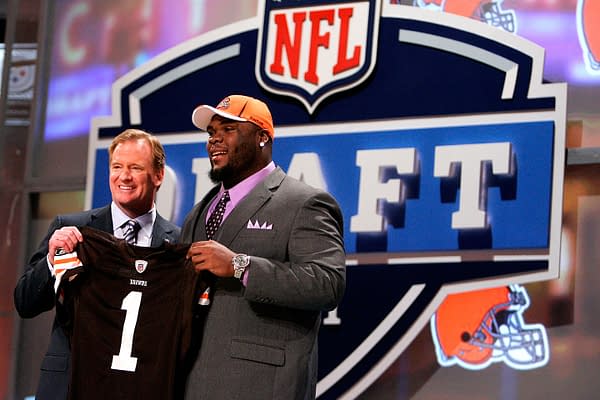Posted in: NFL, Sports | Tagged: cam newton, entertainment, Johnny Manziel, nfl, Roger Goodell, sports
The NFL Draft – A Multi-Million Dollar Guessing Game

The draft was first held in 1936 at the Ritz Carlton hotel in Philadelphia. 81 years later, the 2017 draft is moving back to Philadelphia, but this time being held at various landmarks in the city. The last time the draft was in Philadelphia was in 1961 at the Warwick hotel. Up until last year it had found a home at Radio City Music Hall in New York City. There were only nine teams in 1936 and nine rounds of selections. The very first pick went to the Philadelphia Eagles who selected the first Heisman Trophy winner Jay Berwanger, a halfback out of Chicago.
Berwanger was also the first player to demand a high salary, wanting $1,000 a game. The Eagles didn't think they could afford that, so they traded his rights to the Chicago Bears for tackle Art Buss. Berwanger delayed signing, wanting to keep his amateur status to go to the 1936 Olympics, but he missed out on making the Decathlon team. Berwanger went back to the Bears and asked for $15,000, but the team's owner George Halas would only offer him $13,500. They never found common ground, Berwanger never played a down in the NFL and ended up working in a rubber factory and coaching part time for the University of Chicago.
The draft history is filled with stories like that. Players being drafted by teams they didn't want to go to and forcing a trade. Players holding out for bigger money and missing playing time. Even players skipping the NFL all together to go play other sports. There has always been a lot of intrigue and drama surrounding the draft. Though that was toned down a bit with the last collective bargaining agreement (the contract between the NFL and the Players Union), which created a salary scale for drafted players. This means the players know roughly what they are going to make going into their NFL career based on where they were drafted and it keeps teams from having to pay a fortune to someone who has yet to take a pro snap.
You'd think with that change the significance of the draft would've waned. But that's not the case at all. The first time I even paid attention the draft was twenty years ago, 1997. I was in Las Vegas for a friend's bachelor party and got sick as a dog the first night (Flu, not hung over). I spent the rest of the weekend either sitting at a slot machine or lying in bed in the hotel room. The draft was that weekend and ran all day Saturday and Sunday. It was fascinating to watch. To see these kids sitting around waiting to learn where they were about to be moved to. To figure out what city / state they would suddenly call home for the next three to five years at least. And for them to know the longer they had to wait, the less money they would make. Most of these kids were the best growing up. The best in high school. The best in college. And now they were among the best of the best of the best and they had to realize they might just be mediocre in that crowd. It's an amazing thing to watch knowing that with every name spoken, someone's entire life had just changed.
But the drama doesn't end there. The draft has become one of the most analyzed and speculated events of the football season. During the regular season, analyst try to figure out who is going to win a maximum of sixteen games a week, usually less with bi-weeks. Figuring out the draft means you are trying to predict what 32 different teams are going to do through seven rounds of picks. And each pick can affect the one after. If your analysis picked a certain player to go sixth overall, and someone grabs him second… that could screw up every pick you made after. And there are 220 some odd picks depending on the number of compensatory picks given out (additional picks award to teams who lose players to free agency). But, there are experts who get paid to do multiple mock drafts building up to the real one. Guys like Mel Kiper Jr. and Mike Mayock will watch game tape on just about every eligible college player to get an idea of what round of the draft they may go and then they study each NFL teams roster to figure out what that team needs and then they try to marry those two lists. And it all comes with the caveat that they're probably going to be wrong.

Now you would think that between all of that testing, interviewing, and years of actually playing, you'd be able to tell exactly how a player will do. And you'd be wrong. There are some players who just don't translate well into the NFL. Sometimes it's because of the system they were in in college made them seem better than the really are. Other times it's the attitude of the player who does fine as the BMOC in college but gets overwhelmed when asked to lead in the pros. There has been some pretty big draft busts, especially in the quarterback position. You can look at Ryan Leaf and Johnny Manziel for examples of college stars that just fizzled in the pros. On the other hand, players who are over looked by the experts and drop to the late rounds of the draft have stepped up and shined. Tom Brady was a the 199th pick in the 2000 draft and currently has five Super Bowl rings, 4 Super Bowl MVPs and 12 trips to the Pro Bowl.
You can go through and find a plethora of stories like that. In 2005 there were two quarterbacks considered the top at their position. Alex Smith was drafted first by the San Francisco 49ers. The other player, Aaron Rodgers, sat in the green room waiting… and waiting… and waiting. The camera would lock on him every time another pick was going to be made. He wasn't selected until the 24th pick by the Green Bay Packers. Rodgers is now considered one of the top QB's in the league and has a Super Bowl victory to go with two NFL MVP titles. Smith is with his second team, the Kansas City Chiefs after losing his starting job with the 49ers to Colin Kaepernick who is currently without a team.

What does all this mean? That no matter how much analysis and film study the experts do. There are too many factor to truly predict how the draft will go. Just because they think a certain team needs XY and Z, it doesn't mean the team feels the same way. And their priorities could be different as well based on how the coaches and general managers feel about the players on their roster. And even if you can get a really good idea of what everyone needs and how good a player is (which is also debatable), the fact that a team can trade up or down can screw up an entire mock draft in a heartbeat.
But that's what makes the draft fun to watch. The trades, the drama, the reaction by the experts and the fans. And now that the thing that started as a one day thing in a banquet room at the Ritz Carlton has grown to a three day, prime time event… it's like American Idol on steroids. Not that these guys are on steroids, they get tested for that. It's a chance for fans to see who the newest players are going to be on their favorite teams while watching young men achieve their dreams of reaching the NFL.
With all that said, I'll be going through all the division, laying out what each team needs and I'll be doing my own mock draft… because I can be wrong with the best of them.









